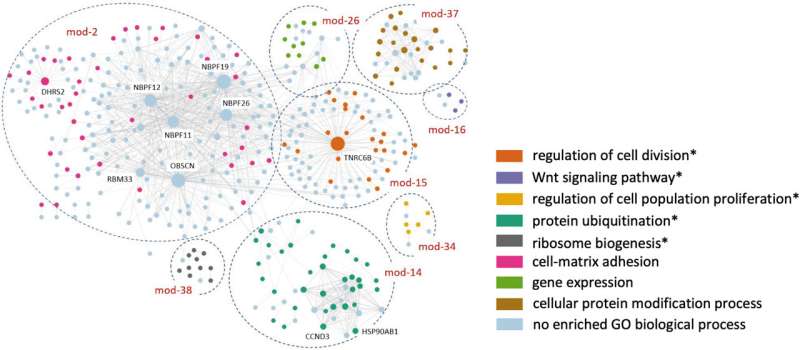This article has been reviewed according to Science X's editorial process and policies. Editors have highlighted the following attributes while ensuring the content's credibility:
fact-checked
trusted source
proofread
Researchers identify novel gene networks associated with aggressive type of breast cancer

Breast cancer is the second-most common cancer diagnosis for U.S. women, and the second-leading cause of female cancer deaths. In recent years, breast cancer treatments have improved significantly, thanks to targeted gene therapy and immunotherapy. However, for the small group of patients diagnosed with the most aggressive basal-like type of breast cancer, such approaches are less successful.
Recently, scientists in the Georgia Tech Integrated Cancer Research Center (ICRC) have found that this particular breast cancer displays a unique interactive gene network structure. Using a type of mathematics called "graph theory," which models relationships between a pair of objects, the researchers computationally detected changes in gene-gene interactions as this breast cancer occurs and develops.
"The discovery of novel gene networks associated with basal-like breast cancers has helped us identify potential new gene targets to treat this very aggressive type of breast cancer," said John McDonald, ICRC founding director, professor emeritus in the School of Biological Sciences, and the study's corresponding author. "We would not have discovered these possible treatments through analyses of gene expression alone."
While causing just 10%–20% of breast cancer diagnoses, basal-like breast cancer is much more aggressive than other subtypes—and if not identified early, when it can be treated by surgery and/or radiation therapy, effective anti-cancer drug treatment can be challenging. The basal-like subtype does not respond to traditional hormonal therapies.
One theory as to why, advocated by many cancer researchers, is that individual genes do not function autonomously; as such, changes in how genes interact with one another in cancer may be as important as the cancer-driving genes themselves.
"The components of any complex system, like the human genome, are certainly important," said McDonald. "The way in which these independent components interact with one another is also critical."
For this study, the researchers analyzed three major subtypes of breast cancer, with particular emphasis on the most aggressive basal-like subtype. The researchers found that gene-gene interactive networks are quite different in the aggressive basal-like subtype, compared to the more prevalent luminal A and luminal B subtypes.
Many of the genes comprising these unique networks were found to be involved in functions not previously associated with breast cancer. Stephen Housley, a neurobiology researcher in the School of Biological Sciences and a co-author on the paper, noted that "an unexpected and intriguing result from our study is that neural processes appear to play a prominent role in distinguishing the highly aggressive basal-like tumors from the less aggressive luminal A and luminal B subtypes."
In total, the researchers examined more than 300 million pairs of genes, comparing healthy women to those with breast cancer. Study co-author Zainab Ashard, a computational biologist who recently worked in McDonald's lab, explained, "Differences in the gene network structure between healthy individuals and breast cancer patients allowed us to identify changes in patterns of gene-gene interactions within breast cancer development."
The team's results are detailed in a new paper, "Changes in Gene Network Interactions in Breast Cancer Onset and Development," published in the April 2024 issue of GEN Biotechnology.
Based on the results of this study and their previously published analyses of eight other types of cancer, the researchers believe they have established the usefulness of network analysis in identifying potential new candidates for the diagnosis of and targeted gene therapy treatment for breast and other types of cancers.
In addition to McDonald, Housley, and Ashard, Kara Keun Lee, a former bioinformatics Ph.D. student who worked in McDonald's lab, is also a co-author on the paper.
The results shown here are in whole or in part based on data generated by the TCGA Research Network.
More information: Zainab Arshad et al, Changes in Gene Network Interactions in Breast Cancer Onset and Development, GEN Biotechnology (2024). DOI: 10.1089/genbio.2024.0002



















